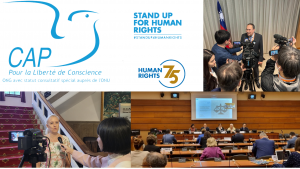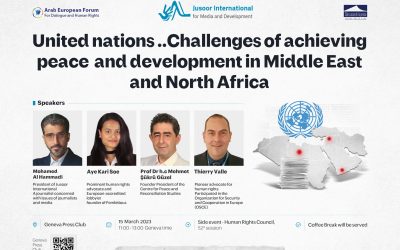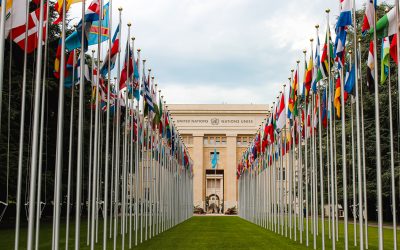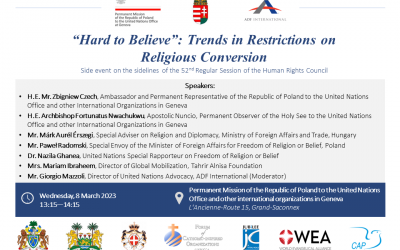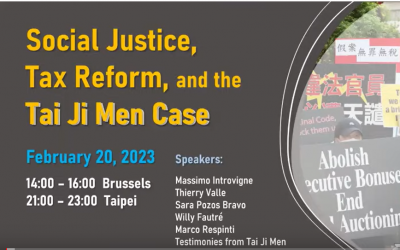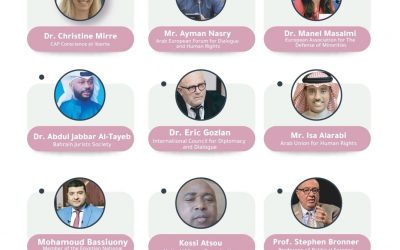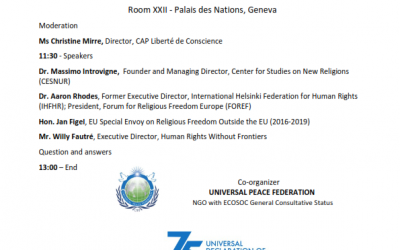
What is “Coordination des Associations et des Particuliers pour la Liberté de Conscience” (CAP Freedom of Conscience)?
CAP Freedom of Conscience is a secular European NGO with United Nations Consultative Status, created in 1995 and dedicated to protect the Right of Freedom of Religion and Belief.
CAP Freedom of Conscience combats all forms of discrimination based on religion or belief by alerting European and International bodies.
CAP Freedom of Conscience collects testimonies of discrimination and human rights violations affecting religious or belief communities in order to disseminate them to international bodies, and in order to raise awareness and inform them as well as to generate debate on the protection of Freedom of Religion and Belief.
CAP Freedom of Conscience also advocates for any religious or spiritual group facing discrimination to have their right to Freedom of Religion and Belief recognized.
CAP Freedom of Conscience is a member of the European Federation for Freedom of Belief (FOB), European Network Of Religion and Belief (ENORB) and participate to the Civil Society Platform of Fundamental Rights created by the EU Fundamental Rights Agency DAFOH Partners in Combating and Preventing Forced Organ Harvesting
Multilateral Negotiations: Keys to Sustainable Peace
Multilateral negotiations are indispensable for resolving complex international conflicts. As António Guterres, Secretary-General of the United Nations, aptly stated, “Multilateralism is not an option but a necessity for rebuilding a better, more equal, more resilient, and more sustainable world.” This principle is particularly relevant in the context of the ongoing Russian-Ukrainian conflict, which has exposed the limitations of unilateral approaches and underscored the need for inclusive, cooperative solutions.
HRC 58 Side-event Human Rights In Pakistan
Join us for an urgent discussion on Human Rights in Pakistan, Particularly the education sector crisis. This event will highlight how ideological influences and rising intololerance threaten fundamental rights, limit access to education, and jeopardize academic freedom
HRC 58 Written statement : Sudan Crisis
At the 58th session of the Human Rights Council, UN experts and civil society have highlighted the gravity of the situation in Sudan and reiterated the urgent necessity of ensuring respect for principles of international law. As the UN High Commissioner for Human Rights, Volker Türk stated “The continued and deliberate attacks on civilians and civilian objects, as well as summary executions, sexual violence, and other violations and abuses, underscore the utter failure by both parties to respect the rules and principles of international humanitarian and human rights law”. [1]
HRC 58 : Unprecedented Human Rights Violations in Tunisia: The Persecution of Political Opponents and the Targeting of Sub-Saharan Migrants.
On 3 March 2025, during the 58th Human Rights Council, Fundacion Vida hosted a side event introduced by Thierry Valle, President of CAP Freedom of Conscience, on Unprecedented Human Rights Violations in Tunisia: The Persecution of Political Opponents and the Targeting of Sub-Saharan Migrants.[1] This side event took place following a strong statement issued by the UN High Commissioner for Human Rights Volker Türk on 18 February 2025 calling the Tunisian authorities to “bring an end to the pattern of arrests, arbitrary detentions and imprisonment of dozens of human rights defenders, lawyers, journalists, activists and politicians”, the statement also highlighted that members of civil society are often accused of illegally sheltering Sub-Saharan migrants, with individuals denouncing racism and the situation of migrants being arrested.[2] The side event was attended by the delegations of the European Union, Antigua, the United Kingdom, Belgium and Austria.
Religious Persecution in Pakistan: The Systematic Targeting of Ahmadis
CAP Liberté de Conscience and the International Human Rights Committee (IHRC) are ringing the alarm bells over the continuing erosion of religious freedom in Pakistan. In a recent joint report submitted to the United Nations Special Rapporteur on Freedom of Religion or Belief, these organizations continued to highlight the systematic and widespread violations of the rights of religious minorities with a focus on the Ahmadiyya Muslim community. The report shows that international intervention is desperately required to prevent the further persecution of Ahmadis in Pakistan, a community that has been persecuted for its beliefs for years.
HRC 58 Written Statement : Tunisia’s Human Rights Crisis
The statement documents state-sponsored persecution, particularly targeting political opposition and sub-Saharan migrants. According to Human Rights Watch’s World Report 2025, over 80 individuals were detained on political grounds by November 2024, including political opponents, activists, lawyers, journalists, and human rights defenders. The electoral process has been severely compromised, with 14 out of 17 presidential candidates either arrested or disqualified, leaving only three candidates—including Saïed himself—approved by the increasingly controlled Independent High Authority for Elections. UN Special Rapporteur Mary Lawlor has condemned these actions, describing the detentions as “a grave violation of international human rights conventions,” and urging Tunisian authorities to create a safe environment for legitimate human rights work.
CAP Freedom of Conscience involvement in Europe
United Nations Challenges of achieving peace and development in Middle East and North Africa
United Nations Challenges of achieving peace and development in Middle East and North Africa
Human Rights in Pakistan- Interactive Talk
This March, GHRD is visiting Geneva to host the Parallel Event Human Rights in Pakistan. This event will be held during the 52nd regular session on the United Nations Human Rights Council (UNHRC), which spans from the 27th of February to the 4th of April. In attending the sessions, GHRD will focus particularly on the following agenda points: enforced or involuntary disappearances; safety of journalists and the issue of impunity.
HRC52 Side Event Invitation: “Hard to Believe”: Trends in Restrictions on Religious Conversion – 8 March 2023
The Permanent Mission of Hungary, the Permanent Mission of Poland and ADF International are co-hosting a side event on the margins of the 52nd Regular Session of the Human Rights Council, titled “Hard to Believe: Trends in Restrictions on Religious Conversion”.
Social Justice, Tax Reform, and the Tai Ji Men Case
Social Justice, Tax Reform, and the Tai Ji Men Case
High-level event : Seminar inaugurating the shadow report of the Universal Periodic Review mechanism Human Rights in the United Arab Emirates
High-level event : Seminar inaugurating the shadow report of the Universal Periodic Review mechanism
Human Rights in the United Arab Emirates
What the Abe assassination reveals about tolerance of hate speech and the deficit of religious freedom in Japan
On July 8th 2022, the assassination of Shinzo Abe, by a lone assassin, caused shock and consternation in Japan and around the world, triggering a nationwide media campaign against the Unification Church, which the assassin falsely blamed for his family’s troubles.





